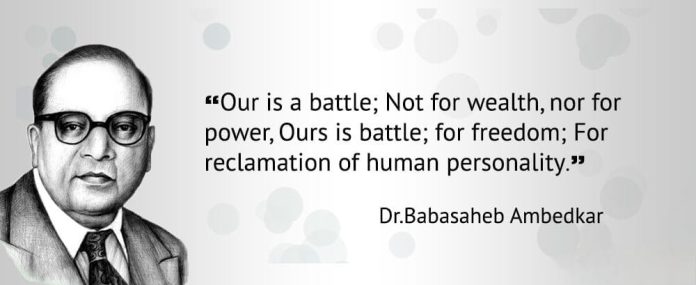14 April 2024
Ambedkar’s vision of societal liberation was characterized by a deep commitment to justice and equality, reflected in his multifaceted concept of freedom. At the core of his transformative ideology were two interconnected dimensions: ‘freedom from’ and ‘freedom to’.
First, Ambedkar emphasized ‘freedom from’ – the urgent need to dismantle the oppressive Chaturvarnya system and Varnashrama Vyavastha deeply entrenched within Hindu scriptures like the Dharma Shastras. Unlike Gandhi, who advocated reforming Hinduism from within, Ambedkar believed that these practices were fundamentally irrational and immoral, necessitating radical change rather than superficial reforms.
Ambedkar’s revolutionary stance was epitomized by his call to metaphorically “dynamite” the Vedas and Shastras, which he saw as obstructing true freedom by undermining reason and morality. His critique extended beyond Hinduism to encompass other religious systems, including Islam, that perpetuated societal injustices. Ambedkar’s unwavering focus was on challenging and dismantling any religious ideology or doctrine that compromised individual liberty and equality.
In Ambedkar’s worldview, achieving true freedom required confronting and abolishing the artificial and privileged influences propagated by foundational texts and doctrines. He recognized that the enemy was not just the adherents of caste and inequality themselves but also the scriptures and teachings that normalized and perpetuated these injustices.
Ambedkar’s critique transcended religious boundaries, reflecting his dedication to universal principles of justice and human dignity. His intellectual rigor and moral clarity inspired a movement towards societal transformation, emphasizing the urgent need to dismantle oppressive structures and ideologies to pave the way for genuine liberation.
Ambedkar’s decision to renounce Hinduism and explore Islam as a potential alternative for Dalits stemmed from profound societal considerations and a quest for existential liberation. His seminal declaration in 1935 provoked diverse reactions, exposing the entrenched divisions and discriminations within Hinduism.
Subsequent conferences, notably the Mumbai Ilakha Mahar Parishad in 1936, provided Ambedkar with a platform to passionately advocate for religious conversion as a means to escape caste-based oppression. He argued that Hindu scriptures, particularly the Dharmashastras, perpetuated caste inequalities, making meaningful reform impossible within the Hindu framework.
Ambedkar’s analysis highlighted the existential plight of Dalits, who lacked communal support and endured constant discrimination. Drawing a contrast with Muslims, a minority community with broader societal backing, Ambedkar underscored the strategic appeal of Islam as a potential refuge from Hindu prejudices.
The spiritual dimension of Ambedkar’s argument emphasized the need for individual empowerment and spiritual fulfilment – qualities he believed were inadequately addressed in Hinduism. He envisioned a religion prioritizing compassion, equality, and personal freedom – values he felt were conspicuously absent in Hindu doctrine.
Ultimately, Ambedkar’s transition towards Buddhism in 1956 reflected a deeper shift towards spiritual considerations. Despite Buddhism’s limited presence in India at the time, Ambedkar was drawn to its principles, influenced since his youth by texts extolling the Buddha’s teachings.
Ambedkar’s journey towards Buddhism embodied a complex evolution, blending existential necessities with profound spiritual convictions. His transition underscores a shift from strategic considerations towards a more profound quest for individual and collective liberation from caste-based oppression.
Ambedkar’s profound vision for societal liberation and equality extended beyond religious reform to encompass constitutional principles that would safeguard fundamental rights and promote social justice. Central to his legacy is the drafting of the Indian Constitution, a monumental achievement that reflects his unwavering commitment to democracy and inclusive governance.
As the principal architect of India’s Constitution, Ambedkar ensured the incorporation of provisions that enshrined equality before the law, abolished untouchability, and guaranteed fundamental rights irrespective of caste, creed, or religion. His emphasis on constitutional democracy was rooted in his belief that legal frameworks could dismantle oppressive societal structures and pave the way for genuine social transformation.
Ambedkar-drafted Constitution stands as a testament to his enduring legacy and commitment to universal principles of justice and human dignity. It remains a beacon of hope and a foundational document that continues to guide India’s democratic ethos and governance.
However, despite Ambedkar’s visionary efforts, contemporary India faces challenges posed by rising Hindutva ideologies that seek to undermine the secular and inclusive fabric of the nation. The resurgence of Hindu nationalism, characterized by the promotion of majoritarianism and exclusionary policies, threatens the pluralistic ideals championed by Ambedkar.
The current scenario of Hindutva in India raises concerns about the erosion of secular values and the marginalization of religious and caste minorities. Ambedkar’s vision of freedom and equality is juxtaposed against the backdrop of growing communal tensions and efforts to reinterpret history through a narrow lens of cultural nationalism.
In response to these challenges, advocates of social justice and equality draw inspiration from Ambedkar’s teachings, emphasizing the importance of upholding constitutional values and resisting discriminatory ideologies. The ongoing struggle to preserve India’s democratic ethos underscores the enduring relevance of Ambedkar’s legacy in confronting contemporary socio-political realities and advancing the cause of justice and equality for all.




